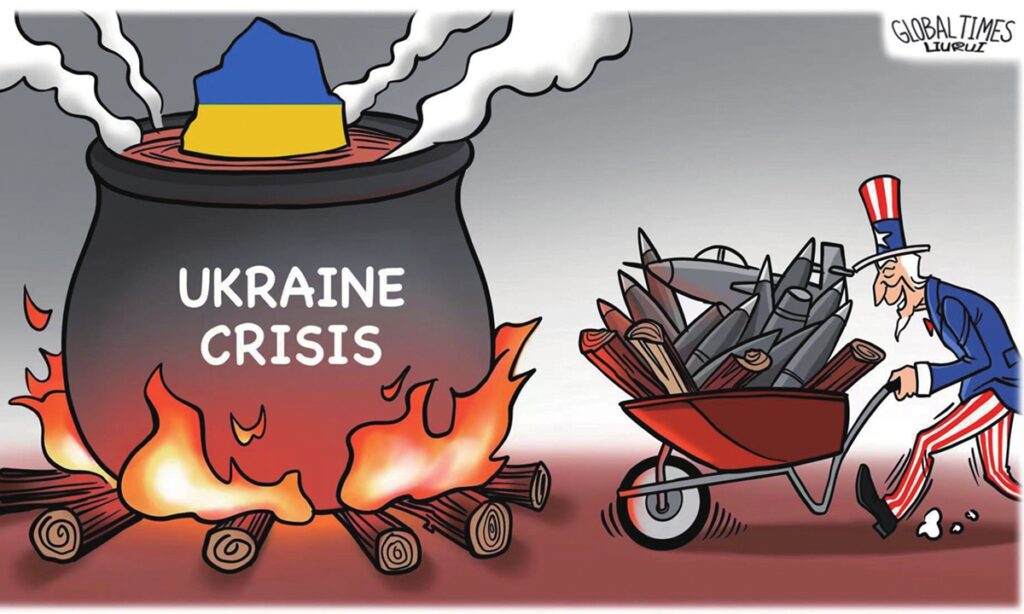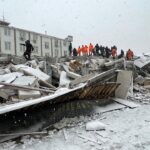As the Russia-Ukraine conflict is about to enter a second year, prospects of a truce or peace are still gloomy, Chinese analysts commented on Tuesday. They said that the conflict is in fact a hybrid war staged by the US aiming to ultimately weaken and dismember Russia, with Ukraine, the unfortunate proxy and the direct victim, hardly having any say about its own fate.
Addressing the General Assembly in New York on Monday, United Nation (UN) Secretary-General António Guterres said that he fears the likelihood of further escalation in the Russia-Ukraine conflict means the world is heading toward a “wider war.”
“The prospects for peace keep diminishing. The chances of further escalation and bloodshed keep growing,” Guterres said.
China’s Deputy Permanent Representative to the UN Dai Bing remarked at the UN Security Council briefing on Monday that conflicts on the ground show no signs of easing up, the logic of military solution still prevails, and a large number of heavy weapons keep pouring into the battlefields. The international community deplores the humanitarian cost of the conflict. But the parties concerned lack the sincerity to promote peace talks and the determination to resolve the issue politically.
Despite the international community crying for peace, the US has revealed plans to reinforce Ukraine’s defense in the long-term perspective, media cited US National Security Advisor Jake Sullivan on Monday.
“We are thinking not just about today’s fight, but about the future capacity for Ukraine to defend itself and deter Russian aggression down the road,” Sullivan said at a virtual conference on Monday. He effectively confirmed that the US is considering shipment of F-16 planes and other complex weapons to Kiev at some point.
“It is not surprising the US is playing the long game and it will not call a truce until it achieves its goal of weakening and dismembering Russia. However, in the process, Ukraine will inevitably become the biggest victim, and Europe, abducted by the US strategy driven by Cold War mentality, is paying the second worst price,” Song Zhongping, a military expert and TV commentator, told the Global Times on Tuesday.
Cui Heng, an assistant research fellow from the Center for Russian Studies of East China Normal University, told the Global Times on Tuesday that the US has benefited from the conflict – weakening Russia while strengthening its control over Europe – and also made quite awesome gains by selling energy, weapons and grains. No wonder the US wants the conflict to continue.
As the conflict prolongs, European assets would be forced to flee to the US, helping the US to rein in inflation and secure the dollar hegemony; while in the political terms, the conflict has become US President Joe Biden’s political assets and would be a useful part of his campaign for the 2024 elections, Cui said.
The US, despite gaining short-term profits from energy and arms trade, will eventually lose, as the international community has increasingly noticed the untrustworthy nature of the US hegemony. De-dollarization and de-hegemony have become more and more a global consensus, Song said.
More political show
Biden, claiming to show support for Ukraine, is scheduled to visit Poland, which neighbors Ukraine, at the end of February to mark the anniversary of the conflict which broke out on February 24, 2022, NBC News reported on Tuesday.
The first anniversary will be a perfect timing for shrewd politicians like Biden to put on a political show, Chinese analysts said. But taking sides between Ukraine and Russia won’t help solve the problem, as the nature of the conflict is a US-staged hybrid war targeting Russia with Ukraine as the proxy.
The European Council has also invited Ukrainian President Vladimir Zelensky to attend an EU summit in Brussels on February 9-10.
Inviting Zelensky to the summit is clearly to further appease Ukraine after previous fruitless talks dashed Ukraine’s hope for a quick EU membership, Cui Hongjian, director of the Department of European Studies at the China Institute of International Studies, told the Global Times on Tuesday.
Zelensky will no doubt take the February summit as a stage for his political show and reiterate his sincerity of joining the EU. However, the old Europe such as France and Germany would unlikely play along, for fear of irritating Russia and losing a wiggle room, Cui Heng said.
Turkey, which has been making efforts to join the EU since 1987, would also be upset if Ukraine, a country far from meeting the Copenhagen criteria for membership, could join the EU so soon, Cui Heng explained.
Cui Hongjian warned that if the US-led West keeps providing military aid to Ukraine, there would be no foundation for diplomatic negotiations.
Overall military support from the EU to Ukraine is estimated at around 12 billion euros ($13.1 billion). Overall assistance to Ukraine pledged by the EU and individual member state amounts to nearly 50 billion euros ($54.5 billion) so far, according to data from the EU website.
What China can do is to push forward the direct dialogues between the US and Russia in a bilateral or multilateral framework, which could provide key ground for peace talks to resolve the conflict, Cui Hongjian said.
(Global Times)




